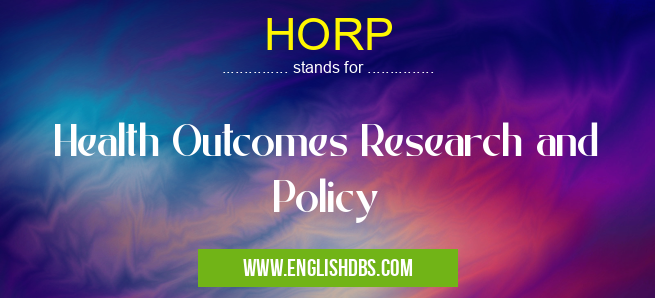What does HORP mean in HEALTHCARE
Health Outcomes Research and Policy (HORP) is an interdisciplinary field of study that examines the impact of health policies, interventions and systems on individual and population health outcomes. It combines elements of epidemiology, public policy, economics, biostatistics, decision science and other disciplines to better understand how to improve the effectiveness of health care services and promote better overall health outcomes. HORP research employs both qualitative and quantitative methods to identify objectives, identify resources necessary to achieve those objectives, review existing evidence available on relevant topics, measure the impact of policy decisions over time, assess the factors contributing to poor health outcomes or disparities in care availability or delivery among different populations, and develop solutions for improving health care for everyone.

HORP meaning in Healthcare in Medical
HORP mostly used in an acronym Healthcare in Category Medical that means Health Outcomes Research and Policy
Shorthand: HORP,
Full Form: Health Outcomes Research and Policy
For more information of "Health Outcomes Research and Policy", see the section below.
» Medical » Healthcare
Description
HORP focuses on finding evidence-based solutions that improve public healthcare systems' effectiveness with a particular focus on equity. This involves leveraging existing data from medical databases, electronic medical records (EMR), patient registries and surveys to monitor trends in key indicators such as mortality rates and access to care. Health economists use these data sources to evaluate policies like insurance coverage expansions or preventive treatments' effects at the population level. Medical researchers also contribute evidence-based insights into healthcare problems by conducting clinical trials or laboratory experiments to find new treatments or test hypotheses about correlations between risk factors and diseases. Epidemiologists are also involved in conducting studies that track disease spread across populations using publicly available information such as mobile phone records or satellite images.
Essential Questions and Answers on Health Outcomes Research and Policy in "MEDICAL»HEALTHCARE"
What is Health Outcomes Research and Policy?
Health Outcomes Research and Policy is a field of study that examines the impact of health policies and interventions on individual healthcare outcomes. This includes research into how health services affect patient quality of life, well-being, morbidity and mortality. It also involves identifying potential strategies to improve or enhance the effectiveness of current policies and interventions in order to improve public health outcomes.
Where does Health Outcomes Research and Policy take place?
Health Outcomes Research and Policy takes place in multiple settings including universities, government agencies, research institutions, hospitals, community organizations, non-profit organizations etc. It can involve both qualitative (e.g. interviews) and quantitative methods (e.g. surveys).
How does Health Outcomes Research differ from other types of research?
Health Outcomes Research is distinct from other types of research because its primary goal is to understand how specific interventions or policies influence people's health outcomes rather than simply evaluating their efficacy or effectiveness. Additionally, it often looks at factors such as cost-effectiveness when considering healthcare options in order to identify potentially better ways to provide high-quality care while controlling costs.
What type of data do researchers use for Health Outcomes Research?
Researchers typically use various types of data such as medical records, survey data, population statistics and other existing data sources in order to gain an understanding of the impact health policies have on people's health outcomes. They may also employ qualitative methods such as focus groups and case studies to further explore the impact of a particular intervention or policy on a specific population.
What are some common goals for Health Outcomes Research?
The primary goal for most Health Outcomes Research projects is to identify evidence-based strategies that can be used to improve healthcare outcomes through better implementation or design of current policies or interventions. Other goals may include finding cost effective solutions that provide equal access to quality care for all populations regardless of race/ethnicity or socioeconomic status; understanding social determinants of health amongst different communities; and examining disparities between individuals who receive similar treatments yet experience different outcomes in terms of morbidity/mortality rates etc.
Who typically conducts research in this field?
Researchers come from many backgrounds including but not limited to economists, epidemiologists, doctors/nurses/medical professionals, public health professionals, policy analysts etc., with expertise ranging from social science theory to clinical practice guidelines and beyond. Furthermore, interdisciplinary teams are often employed in order to take advantage of multiple perspectives when researching complex problems within this field.
What kind of jobs require working knowledge in Health Outcomes Research?
Individuals with a working knowledge in this field are employed across sectors for jobs related directly or indirectly with improving public health outcomes e.g., hospital administrators involved with implementing new healthcare initiatives; policy makers responsible for designing legislative frameworks aimed at improving healthcare access; corporate directors developing strategic plans focused on promoting workplace wellness; epidemiologists monitoring morbidity/mortality rates across populations etc.
How has technology impacted Health Outcome Reseach?
Technology has opened up countless opportunities for researchers within this field such as allowing for more efficient collection/storage/analysis/sharing of large datasets which was otherwise not feasible before; using sophisticated algorithms which can predict patterns better than humans ever could; connecting stakeholders across disciplines more quickly than ever before through utilising cloud computing technologies; enabling faster communication between multi-site studies by real time data transfer etc.
Final Words:
By combining insights across a range of disciplines such as epidemiology, public policy, economics and biostatistics Health Outcomes Research & Policy is able to provide evidence-based solutions that improve public healthcare systems' effectiveness with a focus on equity. HORP allows for meaningful dialogue between stakeholders through data driven approaches aimed at improving patient outcomes while addressing cost concerns related to healthcare delivery. Through collaboration across sectors we can work towards achieving improved public health outcomes through evidenced based solutions identified by HORP research initiatives.
